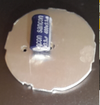Yes a LED is a DC current dependent device, and needs to be controlled by a driver which limit the current it uses, and to work with an AC supply it will need some rectifier, and smoothing device, but the way it does this varies LED to LED package.
It can be really simple


shows both sides of a failed bulb, the dark spot shows where a LED has failed and it would seem in this case a small chip did the current control, some use a simple capacitor, but others are far more complex this one



has a number of boards again a GU10 this one a smart colour changing one, also failed. Clearly since showing pictures of failed bulbs I have also had bulbs fail, but not that many considering I moved over to LED some 8 years ago, and the pair to second one shown is still working some 2 years latter.
I did open one and found the fault a dry joint, fixed and went back into service, but did not open it with intension of repairing it, just wanted to see what was inside.
An electronic device fed by a wire wound transformer is unlikely to have problems with spikes on the supply, the transformer rectifier and smoothing capacitors are likely to remove and surges, but when the electronics correct directly to the mains supply, spikes and surges can clearly reduce their life, hence why today we fit SPD (surge protection device) in the consumer unit.
Also electronic components specially electronic capacitors seen here

are damaged with heat, and so a 7 watt GU10 is far more likely to fail to a 3.5 watt GU10 as it will produce more heat, even using with base down to base up will change how much heat.
However I use to have a draw full of bulbs

so I could renew them quickly when they failed, I really need to dump the bulbs now, as failure is so rare, unlikely to now use the tungsten and CFL types, even if they are still unused and in their packets.
In the days of tungsten every other week a bulb some where in the house would fail, but would think now down to once every 6 months I change a failed bulb, I can see my supply

yes a little on the high side, over 230 volt but not exceeding the 252 volt limit, and I have two SPD fitted, easy for me to check voltage as I have solar panels, which also log when the voltage goes out of spec.

In the main when the system has been switched off for some maintenance, so I know if due to over voltage, but without the solar panels I would have no idea if there was a problem with the supply. Last report was when smart meter fitted.
So have you got SPD fitted?









